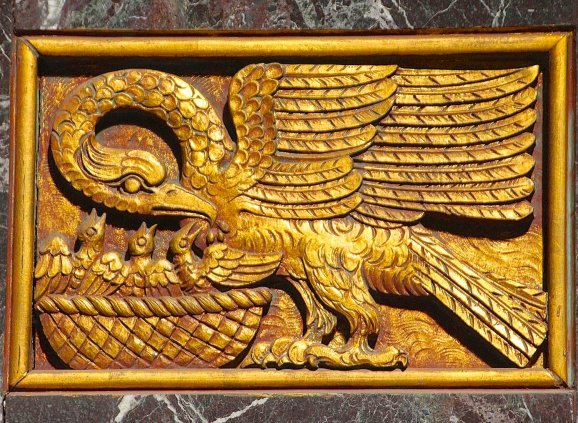
- Education Forums
Flora & Fauna of Trinity: Pelicans

One of the happy results of H.H. Richardson’s design of Trinity is a very open chancel that welcomes worshippers and enables close examination of its elegant layers of symbolic decoration. The next time you make your way up to the altar, take a moment to look for some of these symbols and consider their meaning.
On the wall of the apse directly behind the altar at Trinity Church, we find an intriguing image - a pelican with her babies. Looking closely, we see that the pelican appears to be pecking at its breast and that drops of its blood are falling into the gaping mouths of the chicks.
This image of the pelican is another symbol for Christ and the Eucharist. Often called “The Pelican in Her Piety,” this symbol has its origin in pre-Christian mythology. It was believed that, in a time of famine, the pelican would, out of deep love for its young, peck at its side to feed its offspring with its own blood. Adopted by early Christians as a symbol of Christ’s sacrifice and a representation of Holy Communion, this evocative image is often found in stained glass windows, murals, heraldry, and paintings.
The elegant, art deco image of the pelican in the Trinity Church chancel is one of the many natural images incorporated into this part of the church as part of the 1938 redecoration. This is one of seven small panels that accompany the series of gilt inscriptions that are carved into the green marble that sheathes the apse wall. Chosen by the Reverend Arthur Kinsolving, the Trinity rector at the time of the redecoration project, these panels and the texts represent elements of Christian doctrine, with the pelican symbolizing the Eucharist.
Buildings often have decorative elements that are simply part of the vocabulary of a particular architectural style. Everywhere at Trinity Church, however, symbols such as our pelican provide much more than mere decoration. They contribute a visual dimension to our worship, help focus our thinking, and connect us to the roots of our faith.
- January 2024
- December 2023
- November 2023
- October 2023
- September 2023
- June 2023
- May 2023
- April 2023
- March 2023
- February 2023
- January 2023
- December 2022
- November 2022
- October 2022
- June 2022
- May 2022
- April 2022
- March 2022
- February 2022
- January 2022
- November 2021
- October 2021
- September 2021
- August 2021
- July 2021
- June 2021
- May 2021
- April 2021
- March 2021
- February 2021
- January 2021
- December 2020
- November 2020
- October 2020
- September 2020
- August 2020
- July 2020
- March 2020
- February 2020
- January 2020
- December 2019
- November 2019
- October 2019
- September 2019
- August 2019
- July 2019
- June 2019
- May 2019
- April 2019
- March 2019
- February 2019
- January 2019
- December 2018
- November 2018
- October 2018
- September 2018
- August 2018
- July 2018
- June 2018
- May 2018
- April 2018
- March 2018
- February 2018
- January 2018
- December 2017
- November 2017
- October 2017
- September 2017
- July 2017
- May 2017
- April 2017
- March 2017
- February 2017
- January 2017
- December 2016
- November 2016
- October 2016
- September 2016
- August 2016
- May 2016
- April 2016
- March 2016
- February 2016
- January 2016
- December 2015
- November 2015
- October 2015
- October 2013
- September 2013
At "Educational Forums," enrich your spiritual journey by exploring our resources including videos of lectures, essays by priests, and other pieces about our faith, our church, and what it means to be a disciple of Jesus in the 21st century.


Comments